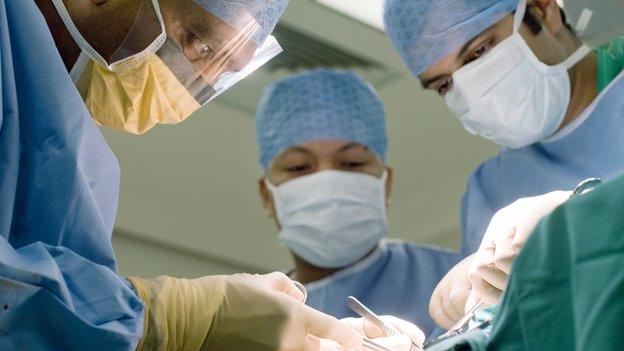Nightmare scenario - waking up under anaesthesia
- Published

The vast majority of patients who have general anaesthetics in hospital do so without a problem.
But writing in this week's Scrubbing Up, Prof Jennifer Hunter, of the University of Liverpool, says more could be done to prevent those few cases where something goes wrong - and that a simple monitor could be the key.
When a patient has a general anaesthetic, they are entrusting themselves to the anaesthetist completely.
They will expect to be gently lowered into a state of calm oblivion for the duration of the operation and at the end to emerge safely and peacefully in the recovery room.
In the UK, about 2.8 million operations are carried out under a general anaesthetic each year. And for the vast majority, that is exactly the experience the patient will have.
But are we doing enough to protect that small minority who are susceptible to the nightmare scenario of waking up too early?
Despite being an integral part of modern surgery, most people know very little about the process that sends them to sleep before their operation.
Anaesthesia consists of a cocktail of drugs - the anaesthetic drugs such as ether that send your brain to sleep, analgesics such as morphine to numb the pain, and, in many cases, neuromuscular blocking drugs, which cause complete paralysis, enabling the surgeon to operate on your chest or belly with ease.
The exact quantities of each of these types of drug have to be exactly right - otherwise there is the danger that, for example, the brain will awaken while the body is still paralysed.
The patient may hear the conversations around them in the operating theatre and desperately try to communicate to the doctors that they are awake - but their paralysis means they may not be able to move a muscle. Not even to open an eye or wiggle a finger.
Such an experience can be extremely distressing, causing sensations of choking, suffocation and panic.
Patients will also be at high risk of post traumatic stress disorder and respiratory problems following surgery.
In research published on Wednesday in the British Journal of Anaesthesia (BJA), doctors in Denmark interviewed 120 patients with a rare genetic condition that made them particularly at risk of premature wakening.
They found that one factor had a dramatic effect in protecting them from accidental awareness - the use of a neuromuscular monitor to determine how paralysed they were.
This was a group with a very rare condition - but other patients are at (albeit relatively very small) risk of such premature awakening - particularly pregnant women, patients with advanced cancer, those with overwhelming infections and those, very importantly, who are morbidly obese.
Morbidly obese patients are a huge anaesthetic challenge, and an important facet of that challenge is determining the exact doses of all the anaesthetic drugs to use.
So these findings have significance beyond the particular patients in the studies described in the BJA.
There is a piece of monitoring equipment that can detect if something is amiss when a paralysing drug has been given - but not every hospital is using it.
A neuromuscular monitor is a small piece of equipment that can detect tiny muscular movements - too small to see with the naked eye or feel by touch - in order to let the surgeon and anaesthetist know if things are on track.
The use of neuromuscular monitors, not only in the UK but throughout the world, is inconsistent and unregulated.
There is guidance that this technology should be readily available - which for the most part it is.
But there are no rules to say that neuromuscular monitors must be used.
Surely, it is time to make the use of neuromuscular monitoring mandatory in modern day anaesthetic practice.